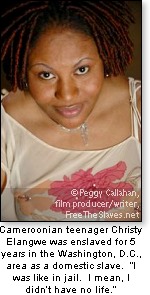
It May Not Look Like ‘Roots.’ But Thousands Share The Defining Traits Of Slaves Through The Ages: They Are Not Paid, And They Cannot Leave
Christi Elangwe must have dazzled the human-resources department at Kmart with her brilliant smile and invincible humor–they hired her on the spot, and she started work just before Thanksgiving. “I’m the greeter,” the 23-year-old says enthusiastically over popcorn shrimp at a Shoney’s restaurant near Washington, D.C. She has opened her first bank account and is finally saving for college. Pride is evident in the staccato of her Cameroonian accent: “It’s my first job.”
“It’s your first job for which you’re paid,” corrects her lawyer, Steve Smitson, who is sitting across from her.
That reminder snapped Elangwe back to a time, less than a year ago, when she says she was enduring unspeakable cruelty in one of America’s wealthiest suburbs. Inside a $284,000 Germantown town house, 20 miles from the White House, Elangwe was, literally, a slave, according to court papers filed Nov. 29. For most of her five years there, she was forbidden from using the telephone, prevented from venturing into the front yard without an escort and prohibited from talking to anybody who might have crossed her path, even on family outings to church. She was kept so tightly under wraps, few of her neighbors knew she existed.
Inside the house, she says, her chores began at 6:30 a.m. and ended only once Daniel Acha-Morfaw, his wife, Vivian Satia, and their three children were in bed; she worked 16 hours a day, seven days a week, for almost 1,800 days on end. If she had been earning minimum wage, well below the going rate for live-in nannies, her accumulated salary might have reached $175,000, says her attorney. But she was never paid.
Slavery is alive in America again. Today’s slaves may not be bought, sold or tortured in the public square, like those in “Roots” or “Amistad,” but experts with the Protection Project, an anti-trafficking program at Johns Hopkins University, estimate that 1 million undocumented immigrants are currently trapped here in slavelike conditions. (By way of comparison, perhaps 6 million Africans were shipped here between 1502 and 1808, when Congress outlawed the Atlantic slave trade.) “These are huge numbers, given the fact that people don’t think this is going on,” Secretary of State Madeleine Albright told NBC News earlier this year.
The victims are mostly women who have been tricked into bondage, ironically often by people who immigrated here from their own homelands. Most female Asian slaves are forced into prostitution rings, serving metropolitan areas with large Asian communities, says Dr. Laura J. Lederer, who directs the Protection Project and has interviewed 50 trafficking victims. Most Latin American slaves are required to work in the fields, while those from the Middle East or Africa are, like Christi Elangwe, trapped as domestic workers in affluent homes. Whatever lot they draw, they all share the two defining traits of slavery through the ages: they are not paid and they cannot leave.
President Bill Clinton’s five-year-old Inter-Agency Council on Women puts the value of the global slave trade at some $9 billion. “It’s incredibly lucrative,” says council director Theresa Loar. “It’s the fastest-growing criminal enterprise, behind guns and drugs, in this country.”
The situation is so serious that in October, the U.N. Crime Commission met in Vienna to draft an international treaty to combat human trafficking worldwide. The treaty contains the first international definition of “trafficking in persons,” recognizing that psychological coercion–and not just the use of force–is now one of the main tools of traffickers. The United States followed suit: on Oct. 28, Clinton signed a bill that gives temporary asylum to the slaves and makes life in prison a possible penalty for the enslavers. “Every year… women, children and men are forced or tricked into lives of utter misery,” Clinton said in his weekly radio address later that morning. “This is slavery, plain and simple.”
In just the past few months, a rash of slavery cases have reached the U.S. courts. In October, the Justice Department indicted one of Berkeley, Calif.’s largest landowners, Lakireddy Bali Reddy (and other family members, all of whom have pleaded not guilty), on charges he lured a dozen women from India with the promise of jobs but had “immoral” sexual relations with them and had them work, unpaid, as maids in his many buildings instead. Texas prosecutors got guilty pleas last August in a case where 100 Chinese and Thai women were agreeing to pay $40,000 apiece to sneak into America every month, only to find themselves pressed into the flesh trade in Houston. A few days later, Rene R. Bonetti–a satellite engineer from Gaithersburg, Md.–was sentenced to 6i years for trapping a Brazilian maid in his home, with no pay and insufficient food, for 20 years. Hilda Rosa Dos Santos testified that Bonetti’s wife, Margarida Bonetti, burned and beat her, and that Mr. Bonetti padlocked the refrigerator. By the time neighbors realized Dos Santos was in jeopardy, she had a festering gash on one leg and an untreated tumor in her stomach the size of a soccer ball. Mrs. Bonetti fled the United States to her native Brazil after she was indicted on charges of abuse. Mr. Bonetti has appealed.
The most-high-profile case will reach a federal jury next month, when Little Rock, Ark., businessman David Jewell Jones–an appointee of the then Governor Clinton’s and a friend of former senator David Pryor’s–is scheduled to stand trial on charges that he twice deputized confederates to go to Guangdong province on the South China Sea, propose marriage to a woman and deliver her to him upon their return, “for the purpose of maintaining a sexual relationship,” according to the Justice Department. The women, Yu Ho Zhong, now 35, and Xiao Ying Wu, 38, ultimately went to U.S. officials with their stories, which Jones’s attorney calls “garbage.” An earlier trial resulted in a hung jury.
Christi Elangwe descended into slavery by stages, beginning in 1993, when she was a sixth grader in Cameroon who wished to attend high school and one day become a nurse. Her parents had little money, however, and could not pay for school. So she did what so many other ambitious young women from her country do. In exchange for tuition, she became a live-in maid for an older woman in a distant village. She was disappointed when her employer enrolled her in a home-economics trade program, instead of regular school. Too timid to object, Elangwe stayed put anyway until she was 17, when her employer proposed a new arrangement. “She told me she has a daughter in America, and she needs somebody to come and check out with the kids, and she will send the person to school,” says Elangwe in her irregular English. “That’s what I really wanted to do, I wanted to go to school.”
But school was apparently never a real possibility. Lynne A. Battaglia, the U.S. attorney in Maryland, contends that Daniel Acha-Morfaw, a computer consultant, and his wife, Vivian Satia, a nurse (both are U.S. citizens who had emigrated from Cameroon themselves), were looking for unpaid labor to help raise their three kids, and broke laws to get it. Less than two weeks ago they were arrested and charged with harboring an alien and forcing her to work without pay. Two other families were also arrest-ed, part of a three-year-long joint investigation by the U.S. Immigration and Naturalization Service and the Department of State. “These are particularly sad cases,” Battaglia says. Both Acha-Morfaw and Satia plan vigorous defenses against the charges, which carry 15-year prison terms and $500,000 fines, their lawyers say.
Elangwe left Cameroon for the first time in her life in February 1995, on a flight through Paris to America. She passed through Customs smoothly, she says, fraudulently using a passport her new employers had mailed her; it belonged to a U.S. resident who barely resembled her, say her attorneys. “I was so excited,” she says. But it was immediately clear she had made a mistake.
Elangwe is quick to point out that her five years of tending to the couple and their children (now ages 12, 10 and 7) were not as hideous as they might have been. She slept on a mattress in a bedroom–alongside the youngest daughter, whom she cared for day and night. She had plenty to eat. She was never beaten. But she was in no way free. She was kept inside the town house almost continually. Often she took care of children of the couple’s friends and relatives, sometimes so many that the home resembled a day-care facility. She was never allowed to visit a physician or a dentist. Occasionally, she begged to be taken to the mall, and reluctantly, they dropped her off there for brief, lonely strolls through its bright corridors. This happened three times–in five years.
Neither Acha-Morfaw nor his wife would talk to NEWSWEEK, and their lawyers declined to comment on specific charges, except to deny any involvement in slavery. “It’s certainly nothing more sinister than” harboring an alien, says Steven D. Kupferberg, Satia’s lawyer. “This girl spoke English? She could have told somebody!”
Elangwe says she held tight to the hope that the pair would eventually loosen their grip on her. “They would say, ‘You’ve only been here for four years, you’ve only been here for five years. Five years is not enough for you to start going out or working or going to school’.” Sometimes they told her they had sent money back home to her family as payments for her labors. But this was not true, say her attorneys, who have investigated the claim.
Nobody kept a gun to Elangwe’s head. Instead of using shackles, Elangwe’s alleged captors kept her locked up through fear. This is not unusual, as Cherif Bassiouni, who heads the International Human Rights Law Institute at DePaul University, says: “The weakest and most vulnerable can be too scared to leave.” “I believed America is no good,” Elangwe says. “[Vivian Satia] said I shouldn’t think America is easy. It’s not everybody can make it in America. It’s dangerous out there. You can get killed. You could go out there and get killed.” Steadily, the idea that she had any role in the larger world vanished entirely.
Because women in less-developed countries have suffered the bulk of the burdens of post-cold-war economic disparities, they make up the overwhelming majority of the world’s slaves. In rural areas of Thailand, a world hub in the slave trade, many girls resign themselves from a young age to work in the brothels that prop up large segments of the country’s economy. The situation is similar in parts of Latin America and Africa. In the former Soviet Union and Eastern Europe, where as many as two thirds of the women live in poverty, even the most spurious promises of American dreams hold a powerful allure. Poor women there are easily taken by traffickers with offers of phantom jobs as dancers, models or waitresses in America–and then pressed into slavery as prostitutes or domestics. So desperate are they for opportunities in Bulgaria, one in four women between the ages of 12 and 35 says she is likely to take a risky foreign job she sees advertised in local papers, according to a recent survey by the International Organization for Migration.
These pressures were behind an enormous Atlanta-based prostitution ring for which eight suspected Vietnamese and Chinese mob members were indicted in 1999 and are now serving federal sentences. They smuggled in nearly 1,000 women as young as 13 from China, South Korea, Laos, Thailand, Vietnam and Malaysia, and farmed them out into brothels in 16 states. All had agreed to repay their travel costs of $30,000 to $40,000, says Assistant U.S. Attorney Janis Gordon, and when they arrived here, prostitution was the only means offered. Their armed captors kept a ledger showing how much each woman owed and how much each was credited after every trick. A copy obtained by NEWSWEEK shows that customers were charged $100 per encounter, $30 of which went to the house. The remainder went to the traffickers. Some women were hired out more than 20 times a day. Most could not keep pace. One woman is known to have earned her freedom over the course of the syndicate’s operation, from 1995 to 1998. It took her 11 months. She gave herself the nickname Lucky.
The INS has identified 250 brothels in 26 states suspected of using unwitting immigrant women as prostitutes. But there are no similar statistics for women who are unpaid nannies in private homes, some held out of view under no more felicitous circumstances.
An intensely upbeat teenager who goes by her initials, “PB”–her true identity is guarded at the request of a Michigan judge–turned 18 a few weeks ago and celebrated with an ice-skating party for a dozen friends. It was her first birthday celebration since arriving in Farmington Hills, an upper-middle-class Detroit suburb, where she lived for four years in a concrete basement. “That’s why I chose kind of a kiddie thing, like ice skating,” she says brightly, “because I didn’t have my teenage years.”
Like Christi Elangwe, PB came to America from Cameroon with promises of an education in exchange for domestic services. What transpired was quite different. For one thing, one of her lawyers, Ronald E. Kaplovitz, suspects that PB’s father–who barters his labor for food back home–may have sold his daughter for cash. Once she arrived in America, she was virtually locked inside and hidden from sight. “We’re a Neighborhood Watch community,” says Susan Aschoff, who lives next door to the stately two-story, $260,000 home that was PB’s dungeon, “but we’re looking for strangers, not for people who are living here, not somebody living next door.” She describes Joseph Djoumessi, a 43-year-old Wayne State University law-school graduate, and his wife, Evelyn, 35, a pharmacist–both had emigrated from Cameroon–as ordinary neighbors. “It seemed like a normal home,” she says.
But Oakland County prosecutors had the pair arrested last July on charges of kidnapping and child abuse. Joseph Djoumessi is further charged with first-degree sexual assault for raping and sodomizing PB over several years, beginning one night in 1998, when he beckoned the minor into his bedroom to watch television. “The wife was at work,” PB tells NEWSWEEK in a steady, thin voice. “He did this four or five times.” She told an arraignment judge that her pain was immense. He threatened to kill her and her family if she told anyone, she recalled. Still, she does not hate him. “It’s past. It’s over. I just feel sorry he did what he did.”
The Djoumessis are in jail awaiting trials, scheduled to begin next month. Both have pleaded not guilty. The husband’s attorney, Bill Mitchell, dismisses the charges as the “silly” invention of a prosecutor in an election year, even while acknowledging that the girl was not allowed to go to school. “In essence, Mrs. Djoumessi agreed to be what amounts to a godmother–they call it ‘replacement mother’–for this young lady,” he says. “Was it a household where she was as free as most American kids? No. Does that make it kidnapping? Is this a child who was enslaved? That is ludicrous.”
PB says she came to the United States after an associate of the Djoumessis’ falsified a birth certificate and passport for the girl, naming her the illegitimate daughter of Evelyn Djoumessi, and stole her into America under a waiver meant to reunite U.S. citizens with their foreign-born children. According to what PB has told the authorities, the Djoumessis were cruel to her from the start. She slept in the basement, bathed using a bucket over a drain in the floor, and believed what they told her, that she would be arrested by American authorities if she wandered out on her own. She was made to wash and clean and feed the children, and get them to the bus, strip and wash and remake their beds, iron everything including their underwear, vacuum under the beds and mop the floors, make the dinner and clean the garage past midnight. She wrote forlorn letters to her parents, but police have since learned her alleged captors never mailed them; her parents wrote her, but the Djoumessis never delivered those letters, either, according to Betty L. Lowenthal, PB’s court-appointed attorney. She never left the house on her own. She never saw a school, which is what upsets her the most. “Here’s what he said to me: he has my life, he can do as he please with it. He can choose to send me to school. He can choose not to. I was being told that if I did tell someone, that I would go to jail.”
But the Djoumessis also screamed at her and beat her, she says. The only time she allows her own anger to spark is when she points to each of the welts that make a galaxy on her forearms. “This is one right here, this is one right here, this is one right here, this is one right here, this is one right here,” she says, touching a fingertip to each purple reminder, “from belt beatings and high-heeled-shoe beatings and stick beatings.”
Last winter, PB says, she learned that the Djoumessis planned to return her to Cameroon and bring back a replacement. The thought of somebody else’s enduring her suffering spurred her to action. “I was thinking way beyond the walls then,” she says. “I was thinking, ‘What would my future be like?’ I was picturing what I had worked for in the past to get me to the seventh grade. I looked through all that. And I was thinking, ‘Is all this going to go to waste?’ I realized they were just playing games with me. All my life I have been told, ‘Nothing will get you anywhere but your education.’ That was stuck in my head. So I was looking beyond that and I said, ‘No. This is too much to let it go to waste…’ I could not take it anymore. I felt like exploding.”
That evening, she bundled up the garbage and headed for the curb. Instead, she walked just 20 feet across the yard and asked her startled neighbors for help. Each night for the next few weeks, garbage under her arm, she unfolded her story in cautious chapters to Susan Aschoff, a 51-year-old mother of children close to PB’s age. “I was astonished,” Aschoff says. “I had no idea she lived there. If the young lady had not found her way to me, I would still be in the dark.” Shortly, Aschoff placed an anonymous telephone call to the local child protective services office. It sent police right away. Within hours, PB was in foster care and Evelyn Djoumessi was being questioned. She insisted PB was her daughter. But then an astute officer asked her when her daughter’s birthday was. She did not know it.
PB is making up for lost time with remarkable speed. She is a 10th grader now, a cheerleader and a swim-team member. If the INS permits her to apply for residency, as her attorney expects, she hopes to stay in America through college, and even dreams of becoming a country-Western singer–more than anything, she says, Shania Twain’s lyrics sustained her over the most difficult years. She offers a sample, beaming as she stretches her click-clack Cameroonian accent into a Nashville twang. Appropriately, the song begins: “Back through the years/ I go wandering once again/ Back through the seasons of my youth.”
Early this year Christi Elangwe reached a breaking point much as PB did, after her alleged captors finally capitulated and began driving her to GED classes two mornings a week. A GED was not what she had in mind. She believed she’d earned the right to attend an ordinary school with people her age. “That’s what made me come,” she says.
She told everyone in class about her circumstances. Despite what her alleged captors had warned, nothing bad happened. Instead, the grapevine carried her story to Louis Etongwe, a 45-year-old Gateway Computer employee in Newport News, Va. Etongwe, a fellow Cameroonian, runs a sort of underground railroad to help free young women from peonage as domestics. Joy Zarembka, executive director of the Campaign for Migrant Domestic Workers, calls people like him “the good Samaritans who are dismantling slavery case by case in the country.”
Etongwe called Elangwe one morning when she was home alone. “I asked her if she was safe,” he recalls. “I asked her if she needed any help.” She wouldn’t say. “I was scared,” Elangwe remembers. “At first I didn’t believe him.”
He placed more secret calls in the next month before she spilled everything. “What she told me really created a sour, bitter feeling in my mind,” says Louis Etongwe. “I couldn’t believe in this day and age someone would treat someone’s child that way. It made me so mad. I said, ‘You have to get out of that place’.” With prodding, she agreed. She made her move early on Feb. 10, after Vivian Satia dropped her off at GED classes. Instead of going in, she sneaked onto a city bus–her first solo bus ride–and rode a few blocks to the meeting place Etongwe selected.
As escapes go, it lacked crackling drama. But Elangwe was terrified nonetheless. It was the first time in five years she had defied her masters. “If you’ve ever been to a dog shelter, that’s the fear that she had when I first met her,” says her lawyer. “It was all so new to her that she had any rights at all and that she could pursue them. And that anybody in the larger world would value her as a human being.”
The INS has “paroled” her into the United States to pursue criminal litigation, and on Nov. 20, Elangwe filed a civil suit against the couple, charging they violated the 13th Amendment of the Constitution prohibiting slavery. She seeks more than $1 million in back wages and punitive damages. She may be allowed to stay here at least through her civil suit, Smitson says, but that’s not the reason they filed it. “I see it as a reaffirmation of her value as a human being.”
Elangwe is somewhat more focused on the practical than that. “I’m trying to save,” she says with a smile. “I still have to go to school.”
source:http://www.newsweek.com/id/104931/output/print






